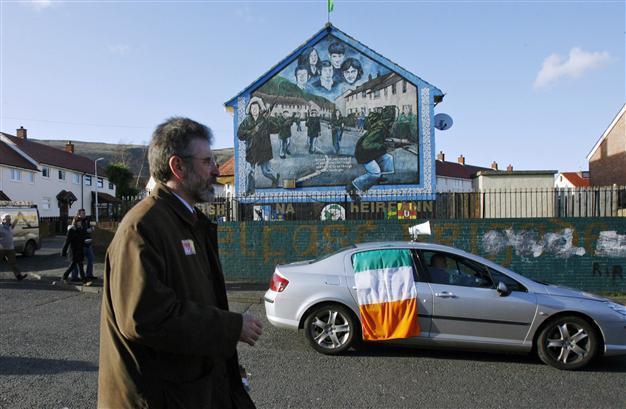British PM calls for more talks to cool Northern Irish crisis
DUBLIN - Reuters

(Files) In this file picture taken on March 6, 2007, Sinn Fein leader Gerry Adams (L) walks past a republican mural as he canvasses in the Ballymurphy area of West Belfast in Northern Ireland. AFP Photo
London and Dublin will hold further talks with Northern Ireland's political parties to try to avert a crisis over an IRA-linked murder that has led to calls to suspend Belfast's parliament, the British government said on Aug.1.
Northern Ireland's First Minister Peter Robinson asked British Prime Minister David Cameron on Aug.1 to suspend the Northern Irish Assembly for four weeks to facilitate talks to save the power-sharing executive it leads with the nationalist Sinn Fein party.
"The Prime Minister has asked the Secretary of State for Northern Ireland to hold further urgent talks with the political parties in Northern Ireland and the Irish Government with the aim of agreeing a way forward," a statement from Cameron's office said after the meeting with Robinson.
Robinson's Democratic Unionist Party (DUP) in Northern Ireland earlier sought the permission of a parliamentary committee to extend the summer recess by a month, but their motion was voted down by Sinn Fein.
The DUP has said it wants Sinn Fein, the one-time political wing of the IRA, thrown out of government after police said a rump of the militant group that formally disbanded in 2005 may have been involved the recent killing of a former member.
Robinson, who has described the crisis as the most serious in a decade, said that urgent talks were needed and that his party could take unilateral action if necessary. It has already threatened to quit the government if Sinn Fein are not excluded.
Northern Ireland deputy first minister Martin McGuinness of Sinn Fein, a former IRA commander, said the proposed suspension was not a good idea and warned that a collapse "would bring a very real prospect of increased violence on our streets."
"Big failure" An end to violence by Irish Republican Army (IRA) guerrillas was a central plank of the 1998 Good Friday accord. The deal largely ended three decades of conflict between mostly Catholic nationalists, who favoured unification with the Republic of Ireland, and Protestants wanting to stay in the United Kingdom.
Senior members of Sinn Fein have denied the group still exists. Police say the IRA is still active in some form, though no longer engaged in terrorism.
The second-largest pro-British party decided to leave the power-sharing government last week over what it described as Sinn Fein's "lacking of credibility".
The current crisis follows disagreements between the two sides over parades, flags and social welfare reform, which Northern Ireland Secretary of State, Theresa Villiers, said must now all be solved.
"The whole system really doesn't work unless there is trust and confidence between partners," Villiers told Irish broadcaster RTE, adding that it would be a huge failure if the governance of Northern Ireland had to revert to London.
